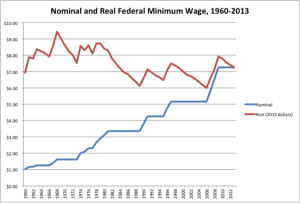MD Lawmakers Should Support Enforcement of County Minimum Wage Increases
Prince George’s and Montgomery counties recently moved in tandem (and with the District of Columbia) to increase incomes for hardworking residents by raising their minimum wage. State lawmakers should support these efforts by enacting a state-level minimum wage increase and authorizing the state Department of Labor, Licensing, and Regulation to enforce higher county-level minimum wage laws.
In recent weeks, Montgomery and Prince George’s counties have joined the District of Columbia in raising the minimum wage for their low-income residents to $11.50 an hour by 2017. This coordinated effort helps low-income residents increase their earning power in an area characterized by a high cost of living, but is also emblematic of a movement of localities across the country that are making up for the failure of Congress and many state legislatures to help the minimum wage keep pace with increasing costs.
(Click to Enlarge)
Source: Economic Policy Institute
Twenty states including DC have minimum wages that are greater than the federal minimum, and cities such as San Francisco, Seattle, San Jose, and Santa Fe have also stepped in to raise wages for their residents.
Maryland state lawmakers should support these efforts in Prince George’s and Montgomery counties. First, the General Assembly should enact a state-wide increase in the minimum wage to help all Maryland residents. As we have written before, doing so would both reduce inequality and support economic growth.
Regardless of whether lawmakers choose to increase the state minimum wage, they could also help support the efforts of Montgomery and Prince George’s counties to ensure that their residents are able to meet the high cost of living in the DC metro area by authorizing the Maryland Department of Labor Licensing, and Regulation (DLRR) to enforce the increased minimum wage laws in these counties.
As discussed by Maryland Reporter, county-level governments in Maryland do not have experience enforcing minimum wage laws, and under current law, DLLR is only authorized to enforce state-level law, which it currently does alongside the federal Department of Labor. To empower DLLR to enforce the greater minimum wage laws in Montgomery and Prince George’s counties, state law must be changed.
The experience of San Francisco shows that proper enforcement is necessary to ensure employers treat their workers fairly and comply with minimum wage laws. After it enacted a citywide minimum wage increase in 2003, San Francisco found it necessary to pass additional legislation enabling its Office of Labor Standards and Enforcement to protect workers and ensure a fair marketplace for employers who abide by the law. Maryland state lawmakers should likewise ensure that the efforts of Montgomery and Prince George’s counties to help their hardworking low-income residents increase their earning power and keep up with increasing prices by authorizing DLLR to enforce these laws.

